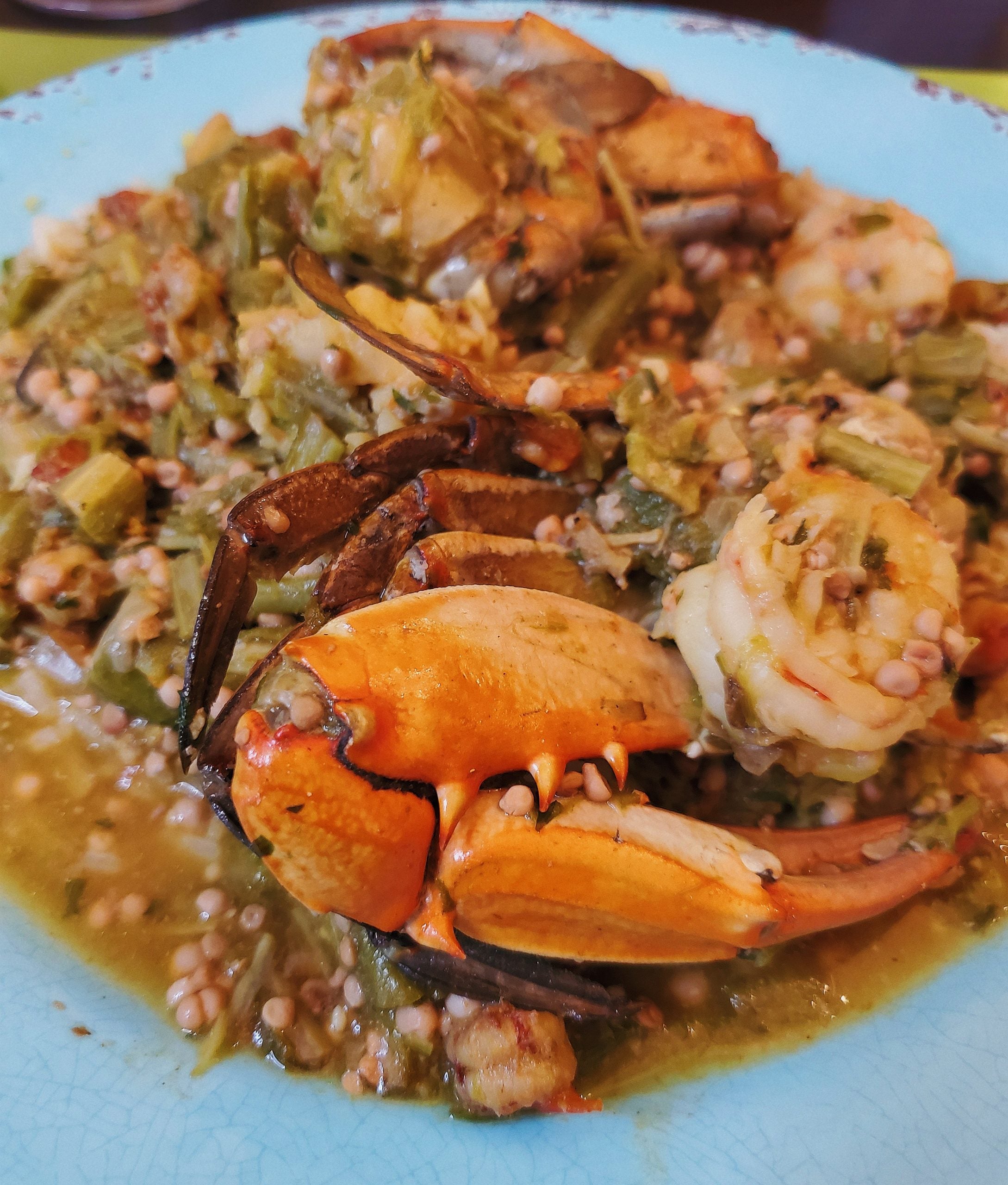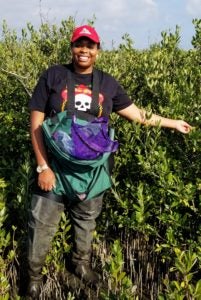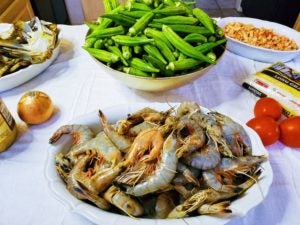
Smothered Okra with Seafood
- Cook Time: 90 min
- Total Time: 1 hour 30 minutes
Notes
“Cooking is a right of passage in my family,” Jessica explains, and was vital to her relationship with her grandfather, Cecil George Palmer. Originally from Jamaica, Cecil began cooking at a young age, eventually obtaining his culinary degree before moving to the United States where he met his future wife.
ABOUT THE DISH

As a child, Seventh Ward-native Jessica Dandridge was captivated by the sands of North Africa and the mysteries of Egypt. In the weeks leading up to her 16th birthday, the aspiring anthropologist was planning her Middle Eastern-themed celebration but, “all that disappeared in the blink of an eye.” Hurricane Katrina made landfall on her birthday, and, like so many others, Jessica’s family lost everything.
Now living in Algiers with her mother, Jessica reflects, “My life has been shaped by water in ways I didn’t even think it was. I was born here surrounded by water and every pivotal moment has involved water in some way.” And so Jessica traded the deserts of Africa for the swamps of her home city, where she now serves as the Executive Director of the Water Collaborative of Greater New Orleans.
The Collaborative focuses on equitable practices to sustainably live and thrive with water. As Jessica explains, “We need to do a better job of restoring and protecting our natural defenses and we need to recognize that it is Black, Indigenous and other communities of color that are most at risk when that environment is threatened or damaged.”
Jessica’s activism is rooted in her own experience. In the wake of Katrina, her mother encouraged her to turn her anger and frustration over the government’s inadequate response into action. That next spring, Jessica joined her first grassroots nonprofit. Her involvement with local organizations led to a startling discovery: “I knew racism existed, but didn’t know what it meant on a social scale rather than just an individual scale.”
Convinced that broader, systemic change was needed, Jessica moved to New York City to pursue a graduate degree in international security and conflict at The New School. She laughs that nearly every class on urbanization and smart cities used New Orleans as an example of post-disaster relief. The waters were calling her back to Louisiana, where her family has resided for generations.

“Cooking is a right of passage in my family,” Jessica explains, and was vital to her relationship with her grandfather, Cecil George Palmer. Originally from Jamaica, Cecil began cooking at a young age, eventually obtaining his culinary degree before moving to the United States where he met his future wife.
Jessica’s earliest memories are of running among the tables in the family’s restaurant, Palmer’s Cuisine, which opened on North Carrollton in 1988. Later, she was allowed to take orders at the family’s stand at Jazz Fest, French Quarter Fest, and Essence Fest, among others. Since losing her grandfather at the height of festival season in 2019, cooking has taken on a new meaning for Jessica, one that stands at the crossroads of grief and memory. As Cecil’s obituary reported, “He cooked until he was called home.”
RECIPE
Ingredients
Ingredients
2 lb. fresh okra
1 1/2 lb. fresh Louisiana shrimp (large), peeled and deveined
1 lb. bag peeled Louisiana crawfish tails (found in frozen seafood section)
6 blue crabs (also known as gumbo crabs), cleaned and halved
1 medium onion, diced
1 Tbsp. minced garlic
2 medium tomatoes, diced
4 cups of shrimp stock (made from shrimp shells and heads, see instructions below)
4 Tbsp. olive oil
4 whole bay leaves
Salt and pepper to taste
Paprika to taste
Dried parsley to taste
Creole seasoning to taste
1/2 lb. smoked sausage quartered (optional)
Instructions
- Preheat oven to 400 degrees.
- Clean and devein fresh shrimp, keeping the shells and heads. Refrigerate cleaned shrimp.
- Place the shrimp heads and shells in a large pot with 6-8 cups of water. Bring to a boil, reduce heat to low, and simmer for at least 30 minutes. (Note: keep an eye on the water, as it will boil over. To prevent this, allow at least 5 inches of space above the water line, stir regularly, and reduce heat as needed. You can also use a slightly larger pot to prevent water from boiling over.)
- Chop fresh okra into half inch-thick rounds. Coat an oven-safe pan with 1 Tbsp. olive oil and place okra in the pan. Spread out evenly and bake for 30 minutes, stirring frequently to prevent burning or sticking. This process is meant to dry the okra out and remove the unwanted “slime” effect. After 30 minutes, the “slime” should have reduced significantly. The okra does not need to be totally dry; some moisture is needed to smother the okra.
- While keeping an eye on your okra, strain the shrimp stock into a heat safe bowl. Discard the shells and heads.
- In a large pot, heat 3 Tbsp. olive oil on medium heat. Add diced onions and sauté until translucent. Add the roasted okra, garlic, fresh tomatoes, shrimp stock, and seasoning to taste and stir. Cover and allow mixture to come to a boil. Turn to medium-high heat and allow to cook for 20 minutes. After 20 minutes, the ingredients should look a little soupy. If not soupy, continue to cook for another 5-10 minutes.
- At this point, you could add optional quartered smoked sausage and cook for an additional 10 minutes. Add crawfish tails and gumbo crabs. By now the liquid should have cooked down to a stew-like consistency. Allow to cook on low heat until almost ready to serve.
- Prior to serving, add cleaned shrimp and cook until firm, roughly 5-8 minutes. If your stew is too thick, add additional shrimp stock or water as needed.
- Serve over rice of your choice. Finish off with your favorite Louisiana hot sauce and a side of fresh cornbread.

“My life has been shaped by water in ways I didn’t even think it was. I was born here surrounded by water and every pivotal moment has involved water in some way. We need to do a better job of restoring and protecting our natural defenses and we need to recognize that it is Black, Indigenous and other communities of color that are most at risk when that environment is threatened or damaged.”
– Jessica Dandridge
Got a recipe to share?
Submit yours now!
